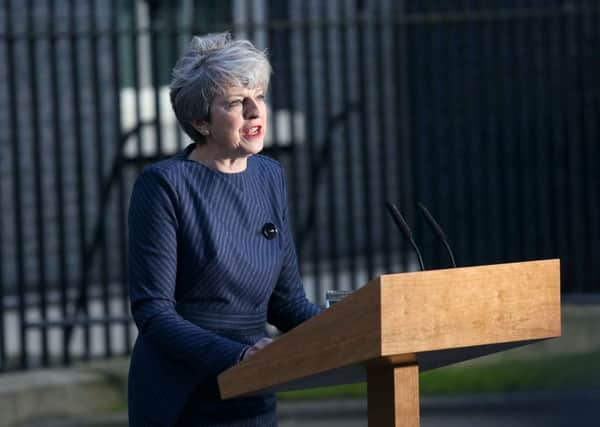Can we really cope with seven weeks of bickering politicians?


David Cameron’s resignation was nothing to this. So here we are, facing another election, doing our Victor Meldrew ‘I don’t believe it’ bit, wondering if we can stand the next seven weeks of having bickering politicians on our TV screens for breakfast, dinner and supper.
It’s a whole new era when you think about it. Only the second woman Prime Minister in history and already she’s proving to be no push over. She declared she will “be unashamedly out there campaigning for the future of the United Kingdom as a United Kingdom. The Union we have between Northern Ireland, England, Scotland and Wales is a very precious union, I think we all benefit by it.”
Advertisement
Hide AdAdvertisement
Hide AdOf course we do, except we have two female leaders within that great Union hell bent on tearing it apart, Nicola Sturgeon leader of the Scottish Nationalists and Michelle O’Neill of Sinn Fein. They are up against the toughest foe they’ll ever come across.
Theresa May has a huge task ahead but this is one woman who is determined to keep the United Kingdom intact. No other scenario will do. She will not go down as the Prime Minister who saw the break-up of the UK, and we have to admire her steely determination. She is a politician without baggage, determined to keep the incompetent elite who ran the country before her under her thumb. Ms Sturgeon and Ms O’Neill may hector all they want. Mrs May is implacable. A UK election was the last thing, too, the European Union wanted. A British Prime Minister with a big majority is someone they cannot push around.
Five years of austerity is over, said the International Monetary Fund (IMF) this week, so that leaves Ms Sturgeon and Ms O’Neill with one less stick with which to beat the British Government. Hearing them and Labour leader Jeremy Corbyn drone on about something which officially no longer exists shows how out of date they are. Even ex-Irish Republican veterans suggest Sinn Fein is not moving on. In a fascinating insight into their thinking reported by the Irish Times last week one suggested that “Ireland would be better off in an economic block with the UK rather than with the EU”. Another said: ”Talk of a united Ireland is all guff”, whilst another described threats of a return of the British army to Border towns like Aughnacloy as “a cheap shot” and the recent “pantomime” of mock Border checkpoints and anti-Brexit protesters dressing up in customs-officer uniforms as “the hysterical interpretation of what may happen.”
A general election has put paid to Sinn Fein’s dreams of being able to persuade every Catholic in the country to vote to make them the largest party wiping out the Protestant majority with all the power and influence that might give them. For the dithering unionists it has given them breathing space to persuade their own reluctant voters to go to the polls. For the population as a whole it leaves us in monetary chaos with all the problems of the NHS magnified as never before with patients waiting even longer for vital operations, schools running out of money, small, essential charities closing because there is no one at Stormont to sanction funding for them and probably worst of all, Direct Rule.
Advertisement
Hide AdAdvertisement
Hide AdOne newspaper this week described Theresa May’s move to an election as “a power grab”, yet she needs a strong majority to tackle the Brexit negotiations given how many traps have been set in her path by Remainers. Sinn Fein could also be accused of attempting to “power grab” in order to “unite” a country the southern part of which has no free NHS and increasing numbers of families depending on charity with the country still paying for the bank bail-outs.